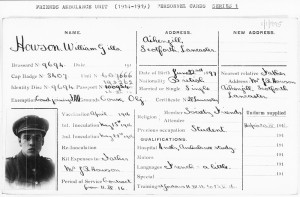Lancaster Royal Grammar School (LRGS) has historical links to the armed forces and a relationship with the local regiment. With the onset of war in 1914 it was perhaps natural for Old Lancastrians (OLs) and the school to get behind the war effort, but there was a spectrum of opinion amongst the LRGS community, ranging from the strong recruiting interest manifested in The Lancastrian magazine of the war years to the pacifist ideals of Quaker OLs. This range of views provides the backdrop for the stories of three Old Lancastrians – Robert Waites and the brothers, John Lamb Howson and Williams Giles Howson – who conscientiously objected to taking part in the conflict and who served instead with the Friends Ambulance Unit.
Conscientious Objectors from Lancaster Royal Grammar School: Contrasting Influences on LRGS’s Quakers in World War 1
Posted by Tom Jarvis and Evan Cowen, Lancaster Royal Grammar School
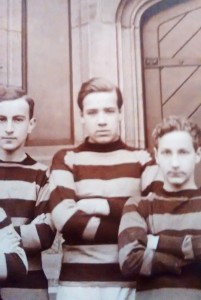
Lancaster Royal Grammar School rugby team, 1914 (William is back row, third from left). With kind permission of Lancaster Royal Grammar School
Robert Waites and the brothers, John Lamb Howson and William Giles Howson, were three Old Lancastrian conscientious objectors. All three were Quakers and served with the Friends Ambulance Unit, including for at least part of the war on one particular train: Ambulance Train 16. The decision these young men took to conscientiously object needs to be set against the conflicting influences of the Quakers’ anti-combat belief and the militarist drive of the time. An indication of this latter influence is the evidence of the existence of a Cadet Volunteer Battalion at the school from the early nineteenth century. In 1914, the Headmaster of LRGS was delighted to finally gain the approval for establishing the OTC (Officers’ Training Corps) in order to usher pupils towards military service, as would have been largely expected of a ‘royal’ grammar school.
Within the Old Lancastrian community there was a relatively substantial increase in those that signed up, which provides an interesting insight into the pressures surrounding former pupils. Two of the three LRGS COs we have researched corresponded to the general age profile of those former pupils who joined the war effort, with John Lamb Howson being 28 and Robert Waites being 24. However, the other – Williams Giles Howson – joined the Friends Ambulance Unit immediately following the completion of his school life, which, given that this was probably mainly due to his brother joining the previous year, is perhaps an insight into the extent of the LRGS influence.
John Lamb Howson was awarded a total of three medals for his services during the First World War: a British War medal, a Victory Medal and a 1915 Star. Despite the honours he received, there was no acknowledgement of his achievements in any issue of The Lancastrian throughout the wartime period.
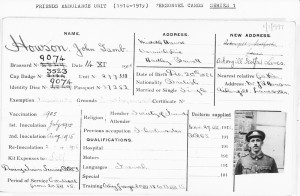
John Howson’s Friends Ambulance Unit Record Card. © Religious Society of Friends (Quakers) in Britain – www.quaker.org.uk
John Lamb Howson’s War Record
John Lamb Howson was awarded a total of three medals for his services during the First World War: a British War medal, a Victory Medal and a 1915 Star. Despite the honours he received, there was no acknowledgement of his achievements in any issue of The Lancastrian throughout the wartime period. This could be seen as particularly revealing of the school’s attitudes, especially when taking into account the clearly significant dangers that the transportation of injured soldiers from the front line encompassed, as Train 16 was bombed in March 1918, although all three OL COs, survived. [1]
Despite the fact that conscientious objectors like John Howson were not involved in open combat, the dangers they were faced with were very real, especially when considering the gulf between the preparedness of the medics in comparison with the soldiers for situations like that of Train 16, as they were unarmed and largely unprotected. The way in which LRGS honoured those Old Lancastrians who fought for their country in the Great War is a testament to the school respecting and recognising those that match the expectations cast upon it; however, without the acknowledgement of any conscientious objector’s service, no matter the extent of the dangers they were faced with or the prestige that they received, we are given the impression that the same level of respect was not extended to those that served in a non-combatant manner.
The school’s cherishing of those that are ‘sweet and glorious’ continues to be immortalised in the Memorial Playing Fields as well as the Memorial Library, and the thriving CCF (Combined Cadet Force) maintains a similar pathway into military service as the OTC did one hundred years ago.
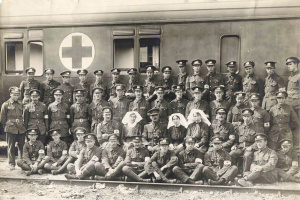
Staff of Ambulance Train 16 (William Howson is back row, second from left). © Religious Society of Friends (Quakers) in Britain – www.quaker.org.uk
Remembering World War 1 at LRGS
The reminders of World War One are still present at LRGS, with one such reminder being the Memorial Plaque – erected in 1929 – in the Memorial Library, which is an important indication of the attitudes that the school held. The plaque includes the phrase, ‘Dulce et Decorum Est Pro Patria Mori’ (meaning ‘It is Sweet and Glorious to Die For One’s Country’), a phrase that decorated memorials throughout the country, and so there is evidence to suggest that the grammar school’s glorification was largely representative of the majority of the nation’s attitudes during the period. Although this is true, the attitudes of Britons largely developed into taking a less favourable view on the Great War post-1960. Poems like Wilfred Owen’s ‘Dulce et Decorum Est’ became more widely established as one of the great war poems from the period, as the satirisation of widespread glorification became popular with an increasing number of people taking a more liberal stance on war.
Even today, this traditional outlook is clear, with the school continuing to be exposed to a number of military influences. The school’s cherishing of those that are ‘sweet and glorious’ continues to be immortalised in the Memorial Playing Fields as well as the Memorial Library, and the thriving CCF (Combined Cadet Force) maintains a similar pathway into military service as the OTC did one hundred years ago.
Changing attitudes towards COs at LRGS
John Howson’s governorship of our school in the 1950s and 60s, however, and the way in which conscientious objectors would be recognised in issues of The Lancastrian by the Second World War offers us a possible indicator of change in the school’s attitude. Former LRGS student, Tom Breheny, explored the changing views at the school towards conscientious objection in his article: ‘Silent Histories from Lancaster Royal Grammar School’. Moreover, on the school’s website under the subpage, Remembering WWI, the school’s contemporary treatment of conscientious objection is described as an ‘issue’, which further reflects the developing attitudes at LRGS. Although it must also be acknowledged that Lancaster Royal Grammar School no longer aims to ‘prepare boys for the armed forces’, as it had so claimed in an advertisement for the school in the nineteenth century, it is clear that WWI continues to exert an influence.
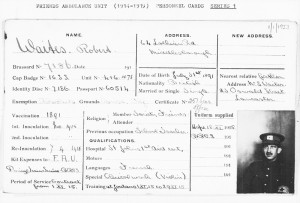
Robert Waites Friends Ambulance Unit Record Card. © Religious Society of Friends (Quakers) in Britain – www.quaker.org.uk
We can only imagine the extent of the difficulties Robert Waites, William Giles Howson and John Lamb Howson faced in making the decision to conscientiously object and the ways in which the contrasting influences of the Quaker and Old Lancastrian communities they were connected with shaped those decisions. What is not in doubt is the men’s unquestionable dedication and bravery in serving with the Friends Ambulance Unit. However, it is notable that, despite the dangers they faced, not one of these three conscientious objectors were acknowledged by their school as contributing to the war effort during World War One.
John Howson’s governorship of our school in the 1950s and 60s, however, and the way in which conscientious objectors would be recognised in issues of The Lancastrian by the Second World War offers us a possible indicator of change in the school’s attitude.
- The LRGS students have used the Pearce WW1 CO Database, the Friends Ambulance Unit online record archive (available at: http://fau.quaker.org.uk) and WW1 copies of The Lancastrian magazine (held in the LRGS archives) to research and write this article. Thanks also go to George Howson for his help with this research.
- [1] Guardian Witness, 2013. No 16 Ambulance Train. Available at: https://witness.theguardian.com/assignment/52751e38e4b01fc33230d4aa/641501


